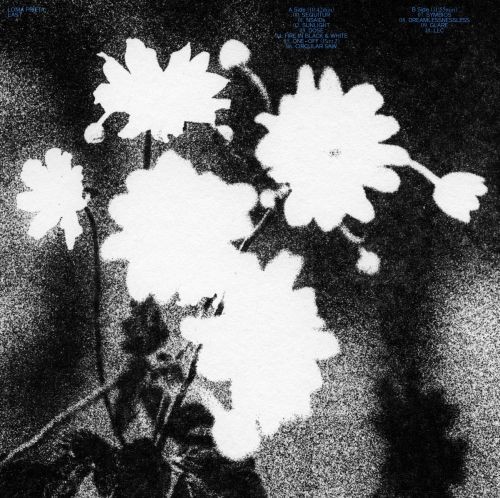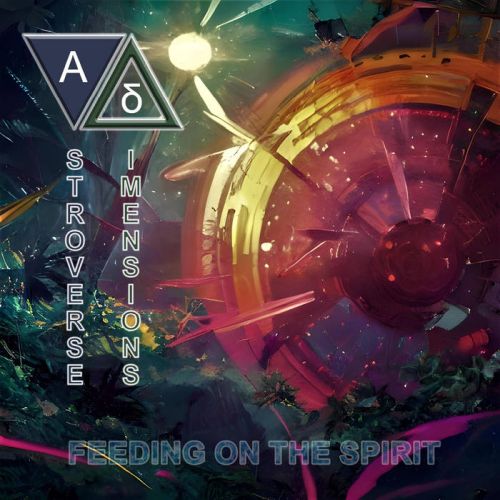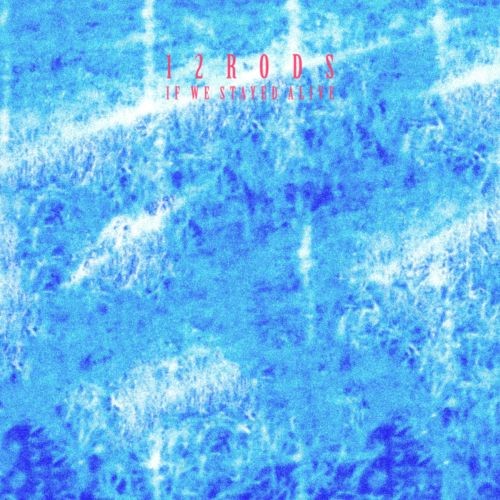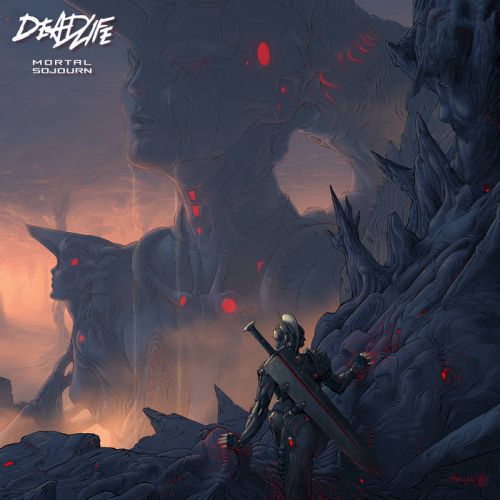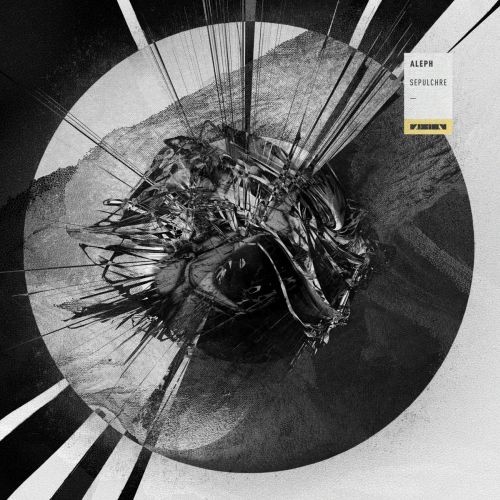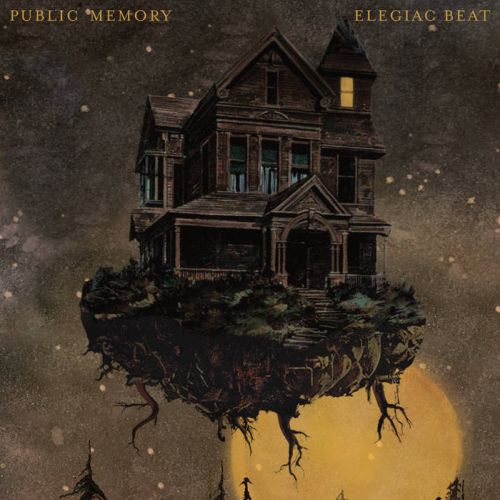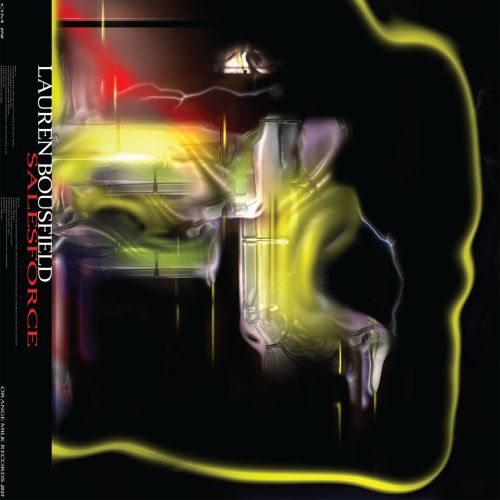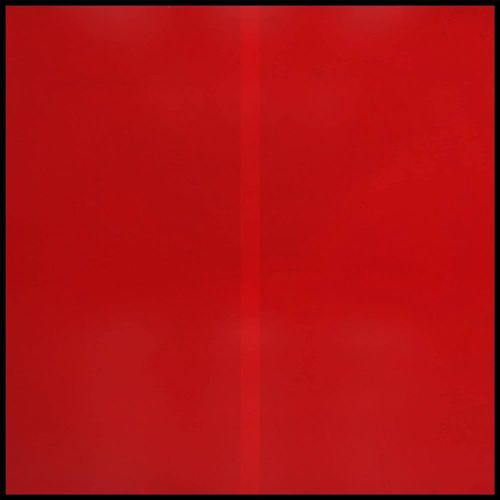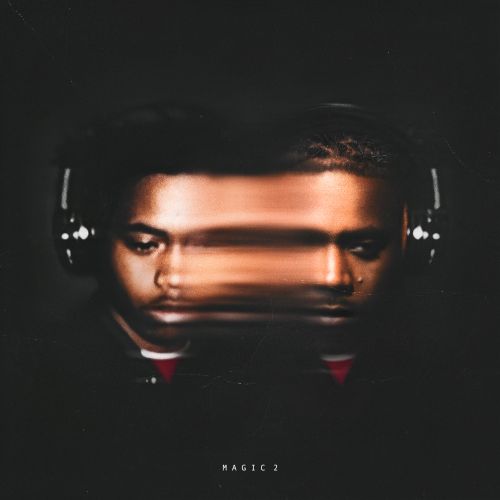Wait A Minute! This Isn't Metal! - August 2023

| Written by: | RaduP, musclassia, Starvynth, X-Ray Rod |
| Published: | September 15, 2023 |
Wait A Minute! This Isn't Metal! - August 2023
Metal Storm's outlet for nonmetal album reviews
The place where we'll talk about music without growls or blast beats
unless they still have those but still aren't metal
unless they still have those but still aren't metal
We here at Metal Storm pride ourselves on our thousands of metal reviews and interviews and article; metal is our collective soul and passion, which is why we bother with this junk. That being said, we'd be lying if we stuck to our trve-kvlt guns and claimed that metal is the only thing we ever listen to. Whether we want to admit it or not, we do check out some other stuff from time to time; some of us are more poptimistic than others, but there's a whole world out there aside from Satan-worshiping black metal and dragon-slaying power metal. We do already feature some nonmetal artists on our website and have a few reviews to back them up, but we prefer to limit that aspect of the site to those artists who have been a strong influence on the metal scene or who are in some way connected to it. This article series is the place for those artists who don't matter to metal in the slightest but still warrant some conversation - after all, good music, is good music, and we all know metal isn't the only thing on this planet for any of us.
Down below, you might find some obscure Bandcamp bedroom projects or some Billboard-topping superstar; as long as it ain't metal and the album itself isn't a best-of compilation, it fits. Obviously, we're certain that not everything will be for everybody (you guys can be viciously territorial even when metal is the only thing on the menu, and we're all supposed to like the same things), but we do hope you find at least one thing that you can enjoy, instead of just pointing and screaming in horror "Not metal!" as if that would be an insult.
Here are our previous features:
July 2023
June 2023
May 2023
And now to the music...
Considering that this is a screamo album, I kinda had an internal debate as whether to add the band and give Last an actual main page review, but considering that both times I did that I got 0 comments (shame on y'all), I went the other route of just relegating it to this feature. Granted, there hasn't really been a wide agreement as to whether screamo is really metal enough as far as extreme punk goes, considering that some of it isn't really grindy or sludgy or noisy in the same way, and Loma Prieta aren't as harsh as they were on the aptly titled Our LP Is Your EP debut from 2006.
With all of their releases beforehand released in the decade between 2006 and 2016, having a record titled Last being released after a seven year gap is pretty concerning, but if that's the case, Last is a pretty high note to end a career on. While not as overtly intense as screamo can get, it still has a very noisy undertone to it as far as the production goes, giving it a more unique kind of intensity. The instrumentals themselves are a lot more melodic, taking cues from post-hardcore, post-rock, and alt rock, and even with some clean vocal moments, a lot of the album's extremity still comes from the harsh screams that sometimes border on shrieks. It's a mix between a softer maturity and an avenue to retain some of the genre's extremity with its mix of melody and noise.
Bandcamp | Apple Music | Spotify
by RaduP
Once upon a time, Perth’s Tangled Thoughts Of Leaving could be considered post-rock contemporaries of Sleepmakeswaves, with the two groups even appearing together on a split. However, even in their early days, there was something unusual about the group that stopped them being easily pigeonholed into the genre, whether it was the prominent use of piano, the off-kilter rhythms exhibiting prog/jazz influence, or the eerie experimentations with noise, and time has led to further experimentation. It’s the kind of oddball take that could inspire a label such as Pelagic Records to become involved with the group, and while new album Oscillating Forest doesn’t come courtesy of this label, it is again a bold and challenging listen.
The combination of dramatic piano, sharp noise and free jazz rhythm on opener “Sudden Peril” elicits a tension and unease befitting the song’s name. Not all songs are so dread-inducing; “Ghost Albatross” veers closer to post-rock with some of its tremolo guitar textures and dynamic contrasts, and “Lake Orb Altar” is almost soothing (overlooking the ominous electronic pulses in its middle). However, the longer tracks here also offer the opportunity to take a step towards the esoteric, particularly on “Twin Snakes In The Curvature”, an abstract, meandering composition with scattered industrial sounds, harsh noises and textures, and then a combination of the piano and jazzy drumming towards the end offering a touch of gentleness and complex melody that sharply contrasts the alien feel of the preceding material in the song. Other tracks push the cacophonic volume further (“Lamprey Strings”), or offer a brief reprieve (“Trinket Forest”); on a second-by-second basis, Oscillating Forest is unpredictable and has no interest in accessibility.
Bandcamp | Apple Music | Spotify
by musclassia
"It might not really be 'pop', but it definitely is 'ultra'." This is how I opened up my review of The Armed's previous album, Ultrapop. And the first sentence especially rings less true this time around, with Perfect Saviors stepping even further away from metal (even if The Armed weren't ever really a metal band as much as a very heavy punk one) to the point where it felt more appropriate to cover them here than on the main page. Granted, they're the kind of band whose sound is everchanging, where each album requires a different combination of vaguely similar genres. Starting with metalcore, then mathcore, then post-hardcore, then noise rock, and now even these don't feel entirely accurate for what The Armed do here. For the first time, it's not as suspicious to add at least a genre tag ending with "pop" to the various genre tags you'd apply to one of their albums.
Now, this is still not a pop album. The prevalent sound is still something more like the indie rock of this century, complete with some cues from the post-punk revival and garage rock revival and the alternative dance that infiltrated the sound of the past decades. That alone is a pretty big departure in sound, but that's the skeleton of the sounds sounding more friendly, because the band then coats them in so much noise and distortion that removed any semblance of accessibility. The poppier appeal and the noise overtones do remind of some of the noise pop affiliated with the early shoegaze movement, something that does tie with the indie rock sound, but the band also does seep in some punk in some riffs and harsh vocals that occasionally appear. The result is something I would never expect to see on Metal Storm's new releases tab, whose sense of heaviness in the "noise Arctic Monkeys" way is so distant from metal's that it ends up more entertaining as a result.
Bandcamp | Apple Music | Spotify
by RaduP
musclassia's pick
The whole ‘Swancore’ niche of post-hardcore has had its fair share of detractors, and I won’t argue that some of the common complaints are baseless; still, while I’m not the biggest Swancore fan, some solid bands have emerged on Blue Swan Records, and chief among them are Hail The Sun. I discovered the group in 2021 courtesy of their album New Age Filth, which turned me into something of a fan almost immediately. With Divine Inner Tension, the group cement their status towards the front of post-hardcore.
The mathy complexity that has appeared on previous efforts and that arguably defines the Blue Swan spin on post-hardcore is still present, but so are the At The Drive-In/The Mars Volta-inspired idiosyncrasies, and Cedric Bixler-esque vocals of drummer/frontman Donovan Melero; his voice is magnetic whether screaming or singing, with such power to his wide-ranging cleans. The songs hit on a range of tones, from the fierce aggression of “Tithe” to the tranquillity of “Feeble Words”, but it’s the ones that lie in between those extremes that are most compelling. The likes of “Mind Rider” (which has a certain Protest The Hero feel to it) and “60-Minute Session Blocks” have the combination of post-hardcore bursts, mathy noodling, proggy dynamics and soaring melodies that makes this band so compelling, and while Divine Inner Tension might not have the immediate memorability of New Age Filth, the writing is comparable, and perhaps even superior, in terms of depth and richness to its predecessor.
Apple Music | Spotify
by musclassia
RaduP's pick
I admit I cover more music from bands I'm already familiar with so something like a debut will likely slip through my fingers, but I'm very glad I got to give this one the time, even if it is the kind of album that doesn't really ask for that much time. Snooper did make EPs before, but you know you've got a very specific kind of punk band when it's not extreme enough to be featured here but also their full length is just 22 minutes long. With most of the songs not even touching the two minute mark, that only makes Super Snõõper feel like more of a breeze.
So, to the specifics, this is a kind of artsy in a way where they enjoy silly lyricism, vocals that are not punky in the most straight-forward way, and noise outbursts and sound effects whose presence in the very short songs feels almost prank-like. Simply put, imagine the most jovial mosh pit. That's how Super Snõõper sounds like. Things only get a bit of a change of pace in the closer, the 5 minute "Running" that sounds like something more akin to post-punk, but that shows the band is capable of capturing an exhilarating energy even without breaking speed limits.
Bandcamp | Apple Music | Spotify
by RaduP
When there’s a 7-year gap between your self-titled debut EP and your self-titled debut full album, there’s a lot of time in which to work on song ideas. As such ideas accumulate, I imagine it must become quite tricky to figure out which ones should make the cut on that long-awaited album. Certainly, Soleo seem to have found it hard, as Soleo’s 15 songs and 84 minutes suggests. It’s quite an extreme offering from the Ohio trio, but while Soleo does admittedly drag a tad as a full-album listening experience, there are some nice musical ideas found within.
Soleo play prog rock, but it’s not a retro-revivalist affair. The most obvious element that differentiates the group from many of their peers is the substantial Eastern musical influence; the band’s frontman Amir Gholizadeh grew up listening to Persian music, and those early experiences shape the composition of an album whose story is built around Gholizadeh’s family history. On top of that, while Soleo are firmly not a metal group, with very limited use of distortion or metal instrumentation, there is something to the writing here that suggests the group take some influence from prog-metal; stick a chunk of distortion on some of the riffs here and they could easily work as metal ones. Along with the Middle Eastern musical influences, I can hear hints of certain American groups, such as Wayfarer in snippets. The album is overlong, and there is still an immaturity to both the writing and the production of Soleo, but in its strongest moments it’s an enjoyable and distinctive release.
Bandcamp | Apple Music | Spotify
by musclassia
Astroverse Dimensions are a synth-heavy space/prog rock band from Germany, and that’s about everything that I can find to say about them in terms of background. That gives the rest of this review to discuss the album at hand, Feeding On The Spirit, and considering that this is an hour-long record with 16 songs, perhaps that’s a good thing. Stylistically, if you imagine ‘synth-heavy space/prog rock’, you’re going to be very close to the reality of this record; there’s no radical reinvention of the concept or left-field take on it. The guitars are perhaps heavier and more distorted than they might be for a lot of acts in the style, but not to the extent that it turns into metal, and the lively drumming and heavy use of synths/electronics feels intrinsically familiar.
It is arguably overall a more frenetic album than a lot of space rock; the drums are very active on the likes of “Nebula” and “Emergence”. However, while the drumming is impressive, it is often the synths that are most prone to catch one’s attention, with some brash synth melodies popping out of the speakers on the two aforementioned songs (in each track, there’s also segments with left-field ska-style rhythms underpinning the lead lines). On “The Great Attractor”, some of the keyboard parts veer closer towards a classic old-school prog (or at least Opeth retro-prog) sound, and the title track also feels quintessentially 70s prog; the former song does, however, also see some lead guitar taking over/complementing the synth leads. 16 tracks is a lot of instrumental synth-prog, although half of these are shorter quasi-interlude pieces that strip away most of the rock and just focus on the synth work; still, it’s quite a lot to digest, but for fans of the style, it’s a fun album to get stuck in.
Bandcamp | Apple Music | Spotify
by musclassia
‘Expanding’ is a very apt titular word for an album with the girth of Expanding Majesty; containing only 4 songs, it spans nearly 70 minutes of runtime. Expanding Majesty expands on the more accessible song lengths of 2020’s The Ear Food, instead returning to the long-form psychedelic meanderings of Sparkling Waters. Mammatus are a band that the terms ‘stoner rock’, ‘psychedelic rock’ and ‘space rock’ can be used in reference to; on occasion, they lightly flirt with heavier metallic sounds, such as with the heavy, droning chords early in “By The Sky”, but overall this is rock of a lively, improvisational and expansive kind.
The album starts off very strongly with the title track; large stretches of this track feature lively, complex guitar meandering that goes nicely with the slick underlying grooves, which are bolstered further by glowing space rock synths. The only major change in pace occurs in the closing minutes, when the song slows down a tad to turn up the heaviness; this heaviness carries over into the lumbering, ponderous drones of “By The Sky”, but the joyful tones of the guitar leads and keyboards in the second half of this track give it a real expanding majesty. The record is very impressive for the style, but it is let down slightly by “Foreveriff”; this song also plods around, but without the same euphoric vibe, and instead it meanders, at times a tad listlessly, for an enormous 23 minutes. Thankfully, “Beams Of Light” offers a more concise and album-encompassing experience to close the record out on a high note.
Bandcamp | Apple Music | Spotify
by musclassia
Motorpsycho have appeared on several occasions in our non-metal articles, which shouldn’t be a surprise, considering they’ve been a consistently prolific band pretty much since they formed over 30 years ago. However, new album Yay! does represent something of a shake-up from the trio of records that have previously been covered on Metal Storm (The All Is One, Kingdom Of Oblivion and Ancient Astronauts); these albums were full-blown prog rock, at times on the heavier side, with several songs running for over 10 or even 20 minutes. In contrast, Yay! is a throwback to 60s/70s psychedelia, and to the band’s turn-of-the-millennium psychedelic period.
Although Yay! is the last Motorpsycho album to feature Tomas Jämyr as drummer, he doesn’t get to contribute all that much to this release. Predominantly acoustic, this album goes in a flower power direction (as the artwork indicates), and it is the dreamy vocal harmonies and delicate guitar noodling that are the leading elements of songs such as “Cold & Bored” and “W.C.A.”. However, the album as a whole isn’t entirely stripped-down; “Patterns” is more of a post-millennial mellow prog rock song, with a delightful guitar solo, while “Hotel Daedalus”, with its distortion, big strings and proggy songwriting, is one track that could have featured on one of their more recent releases. The fact that “Hotel Daedalus” is comfortably my favourite song on Yay! does suggest that perhaps the band’s latest change in style isn’t entirely playing to my tastes, but this is still a pleasant and lush-sounding release.
Bandcamp | Apple Music | Spotify
by musclassia
I guess there is merit to calling something "comfort music", the kind where you put on without the intention of engaging with it artistically but just letting it lift you up. Like, I'm not being lifted up by Imperial Triumphant or Black Country, New Road even if it's music I enjoy, but there's just a feeling of warm dissociation and a hazy mellowness that I'm searching for that's vaguely melancholic or nostalgic without necessarily aiming to resonate with certain negative feelings, something that doesn't feel like it's made for background listening but doesn't demand much attention. Some things like Shelter scratch that itch.
It's a bit ironic that it shares its name with an Alcest album I feel somewhat similarly to. But Alice Phoebe Lou is an artist I've been following since her second album, now reaching number five, and my relationship with her music isn't especially deep, but more like the kind of thing that I really enjoy while it's on, the vaguely otherworldly mix of soft rock and dream pop that feels so so warm and fuzzy, even if no song in particular made me feel like I really want to return to that particular one. It's like that really really warm blanket at a hotel you're staying in on a trip, but you return to it every time Alice Phoebe Lou releases another album.
Bandcamp | Apple Music | Spotify
by RaduP
It's weird to think now that there's more Hozier releases that I did review for this feature than albums that I didn't, even if that one album I didn't was the one that has the one Hozier song that everyone knows. Granted "Take Me To Church" is one of the best songs to hit the mainstream, but with how much of Hozier's sound relies on how spectacular and impactful his voice is without necessarily being technically impressive as much as just very emotionally potent, he was pretty much cursed to be stuck between trying for a more accessible sound and a more soulful one without really breaking into the mainstream again nor achieving huge critical acclaim besides being very respected for what he does. Wasteland, Baby! was a bit more ambitious and also messier as a result of just that, and in a way that's something that still plagues Unreal Unearth.
There's still a lot within Unreal Unearth that feels like the YouTube commercial kind of indie folk that plagues the 2010s, and attempts at a commercial sound are still part of it, especially in the openers. But the album does promise something a bit more ambitious in a more literary take on lyricism, and a concept centered around Dante's Inferno, and that's a switch-up that is somewhat reflected in the sound of the album being a bit more fleshed out and there's more of it that works without really aiming for mainstream appeal. There's more of it that makes an impact with the way the production in the background supports the vocals that makes it a very pleasant listen all throughout and making the whole thing feel a bit more bright and intimate is a nice way to bring up more subtlety than the bombast that he aimed for with previous releases.
Apple Music | Spotify
by RaduP
musclassia's pick
My appreciation for Pelagic Records isn’t something I’ve kept secret; it feels like every few months I find an opportunity to sing their praises after discovering yet another great album. The bulk of the Pelagic roster is focused around sludge, prog and post-metal/post-rock, but they aren’t confined to these subgenres, or even to metal at all. One of the more surprising discoveries I’ve made through the label is Jaye Jayle, the alter ego of Evan Patterson (who has been active in various other projects, including Young Widows and Breather Resist). While some of Patterson’s other bands have been on the heavier side, Jaye Jayle is detached from any kind of aggression. Instead, Don't Let Your Love Life Get You Down (the aptly titled first album from Jaye Jayle since Patterson’s divorce from Emma Ruth Rundle) explores a dark gothic singer-songwriter sound reminiscent of acts such as Wovenhand, Nick Cave or perhaps more recent Dead Can Dance or Gary Numan.
While the album has a dark touch to it, Don't Let Your Love Life Get You Down isn’t (overly) gloomy; Patterson’s voice, while very capable of low-register crooning on the likes of “The Party Of Redemption”, where it fits neatly with the subtly rich mesh of acoustic guitars, backing synths, and (in patches) harmonica, but there’s a certain brightness to the vocals on “Warm Blood And Honey”. There is an underlying folk/country current to the tracks, but the ways in which this is rendered can vary quite a bit between songs, ranging from the subdued electronica on “Tell Me Live” to “Waiting For The Life”’s shoegaze textures and synths. Perhaps the most ‘out there’ composition here is closer “When We Are Dogs”, an achingly spacious, slow-burning track with reverberating percussion, droning strings and soulful saxophone (performed by Patrick Shiroishi, who has also collaborated previously with Rundle) that turns eerily dissonant and cacophonic as it progresses. Don't Let Your Love Life Get You Down isn’t your regular Pelagic prog/post album, but given the sophisticated tastes of the label’s talent scouts, you can understand how an album as accomplished and refined as this could end up on their radar.
Bandcamp | Apple Music | Spotify
by musclassia
Ruben Wijlacker may be known to some as the founder of the now-defunct Folkstorm or as a long-time member of the Dutch avant-garde black metal band Grey Aura, but his own one-man project IJdelheid is still relatively unknown. However, this is neither due to the quality of the music nor the low frequency of releases.
Multi-instrumentalist Wijlacker released his first EP under the moniker IJdelheid in 2020 and the full-length album Unholy in 2022, swifty followed by another EP. That's why it surprised me a little at first when the sophomore album was already announced for the following year, but the first single quickly dispelled my worries that quality might have to give way to quantity. Alas, I Am Morbid! invites listeners on a dreamy, melancholy journey into the unknown, and it's Wijlacker's gentle voice, seeming infinitely vulnerable and fragile, but also conveying just as much familiarity and comforting security, that instantly carries you away. The rigid boundaries of musical genres don't seem to exist for him, because the elements of neoclassical darkwave, gothic and ambient he intersperses fit seamlessly into the fabric of dark folk and dream pop and merge with each other to create something new. While most neofolk vocalists rely on their low voice, Wijlacker uses his voice in a more variable and experimental way. He often strikes surprisingly high notes and rises to a sudden crescendo, or sings a duet with himself while polyphonic choirs sound in the background. There is hardly a song where you don't wonder if there really is only one singer behind the mic - and that is perhaps the greatest praise that can be given to a vocalist, let alone a black metal vocalist.
Bandcamp | Apple Music | Spotify
by Starvynth
Radu threw this album at my face. Yes, he wanted me to review an album of a band I don’t know for the sake of a joke. So this is Rod (Metalstorm reviewer) reviewing 12 Rods (the band). You know what they say: All good things come in
Like most music labeled by the broad term “Indie Rock”: If We Stayed Alive has a very eclectic sound. Raging from dream pop / shoegaze to some alternative rock and grunge. Ryan Olcott’s vocals have a very particular sound to them as they sometimes make me think of Ozzy Osbourne if he had gone for softer rock. “My Year (This Is Going To Be)” is a good example of that. He can have quite a nasal tone yet it remains charismatic and goes well with the relaxing vibe of the music. Tracks like “All I Can Think About” and “The Beating” are particularly soothing and have very groovy and present bass. There is a very sweet combination of naive hope and nostalgia pouring from this little record. Pretty much like all revival shoegaze going on lately. I don’t know if I need 11 other Rods to sell you this album but I can assure you that 12 Rods are enough for you to have a good time down memory lane while looking at the future with optimism.
Bandcamp | Apple Music | Spotify
by X-Ray Rod
The worst part of reviewing a July album in September is that the obvious summer vibes are starting to get lost bit by bit. Sure, I'm in that specific way thankful that I still have to turn on my AC, and that the new school year didn't start just yet, but there's a dread that it's all going to be over soon and I'm thinking more of the summer that was rather than the "summer" that still is. Which, come to think of it, makes perfect sense for George Clanton's Ooh Rap I Ya, an album so full of 90s nostalgia and existential lyricism. Maybe it is worth looking back to how summer was.
A lot of what George Clanton does takes cues from the vaporwave explosion of the 2010s, certain branches of it like chillwave more specifically, a more hypnagogic take on nostalgia and retro sounds, but these embellishments only work because of how well the 90s sounds of shoegaze, neo-psychedelia, alternative dance, or alternative rock all work to create this sort of corrupted time capsule where George's existentialism can cope with that sense of nostalgia. It's definitely possible to enjoy the way Ooh Rap I Ya is constructed without giving much thought to the implications of nostalgia in the lyrics, but there's a reason why these work together.
Bandcamp | Apple Music | Spotify
by RaduP
RaduP's pick
If you go to the shoegaze page on Wikipedia and look through the list of ‘prominent shoegaze groups’ in the second paragraph, you will notice two trends: most of the bands are British, and most of the bands have had a decade-long hiatus that spanned the turn of the millennium. Few genres have had as immediate and drastic decline in popularity (owing in no small part to the emergence of Britpop), yet the ever-burgeoning nostalgia for pre-2000 culture in the present day has provided a platform for many of these groups to return. Slowdive were later than many of their peers in taking this step, only reforming in 2014 (perhaps due to the ‘career suicide’ response to Pygmalion, their last record before disbanding), but they’ve certainly committed to the reunion, following up 2017’s self-titled record with the fittingly titled Everything Is Alive.
The experimentation of Pygmalion has perhaps been carried over to some degree into Slowdive’s post-reunion writing, with this new release initially conceived as some kind of minimalist techno before being further fleshed out, but Everything Is Alive nevertheless feels firmly rooted within shoegaze, with trademark walls of shimmering guitar sound. There is a melancholia to this release that maybe wasn’t there in the early 90s, a result to age and losing loved ones (two members lost parents during the pandemic); airy, featherlight post-rock such as “Prayer Remembered” sits side by side with tender alt-rock cuts like “Shanty” and “Alife”. Those electronics make their mark on Everything Is Alive, none more so than on the sumptuous “Chained To A Cloud”, with ambient synths building a serene atmosphere that is elevated by soothing synth loops. Long after the genre in which they emerged was written off as relevant, Slowdive demonstrate that they continue to be vital.
Bandcamp | Apple Music | Spotify
by musclassia
Some exiled Tuareg folks from Mali end up meeting and coming into contact with the music of Bob Marley, Bob Dylan, and Jimi Hendrix. In times of uproar and revolt, electric guitars might seem like unconventional means of achieving goals, but that's roughly how Tinariwen, one of the oldest tishoumaren bands, was born. With albums going as far back as the early 90s, being well renowned for spearheading a festival in the Saharan desert, and being the face of this very specific kind of desert rock since given more popularity by bands like Etran de L'Aïr, Mdou Moctar, or Imarhan, Tinariwen put the many decades under their belt on full display on Amatssou.
Reviewing Tishoumaren albums isn't precisely easy for me, not only because I'm not that familiar with Tinariwen's back catalog, but also because a lot of bands seem to follow pretty established sounds, ones that work really well in this folk influenced desert rock tradition, but telling apart what makes each album special is a bit difficult. Amatssou however does benefit from a couple of guest spots and extra instrumentation like pianos and steel guitars and strings that do give it some touches of western country music or even some desert rock sections that don't feel that far from what Earth would do.
Bandcamp | Apple Music | Spotify
by RaduP
This is a very unusual kind of album and not the kind I generally cover. For one, it is a posthumous album, which I am not opposed to covering even if a lot of posthumous that aren't almost completed by the time of the artists' passing feel more like cash grabs than anything respectful. Well, Mort Garson never envisioned an album called "Journey To The Moon And Beyond", so even if the album is recent, the material on it is far from. Mort's passing in 2008 is quite a long time ago, but a lot of his works were done in the late 60s and early 70s, so is the material compiled here, all from different sources, some advertisements, some film soundtracks, some... something else.
Garson's role as a pioneer of electronic music, particularly of the kind that enjoyed an overabundance of moog synthesizers, hence the genre name; is often quite overlooked, and the only release from him I've heard prior was the Mother Earth's Plantasia one from 1976 that came relatively late compared to most of the stuff he did. Some pieces were still missing, the most important part and what seems to give the entire album its concept, is a soundtrack to the live broadcast of the 1969 Apollo 11 moon landing, as first heard on CBS News, with whimsical moog sounds that sound about as dated as you could expect from electronic music of the time, but there's definitely charm in that.
Bandcamp | Apple Music | Spotify
by RaduP
Blank Banshee was one of the biggest names of the vaporwave explosion from ten years ago (sorry, I mean 【vaporwave】) alongside other acts like Chuck Person, Saint Pepsi and Vektroid. That was a wave that eventually died down, alongside the related cloud rap one, partly because the acts involved in it were overly prolific, but the influence on the sound and aesthetics of the decade remains undeniable, and continues to echo through this decade. That's also why acts like death's dynamic shroud continue to stay relevant by intermixing some of the qualities of vaporwave with related genres like glitch pop or progressive electronica, and that seems to be the case for Blank Banshee as well, after a more ambient focused album last year with Music for Menus, now we have another album without anything vapor related as a main genre tag.
You can still kinda tell that the lineage does come from that wave I mentioned, with a very hypnagogic quality still remaining in the atmosphere and a lot of sounds most reminescent of their MEGA album, but it is now transported to some of the IDM sounds that influences Blank Banshee's work in the first place, sounding pretty similar to something like Aphex Twin and Autechre. The soundscapes get a lot from post-industrial and synthwave and ambient techno, but somehow sounding more jovial at it. Even though influences become more clear, 4D ends up feeling more forward thinking as a result due to how well the sounds blend and how adept Blank Banshee is at crafting these melodies and layers that feel so ethereally uplifting. The track lengths are pretty short, so a lot of it feels a bit underdeveloped, but the proof of concept in the sound is so exciting that I'm excited for what Blank Banshee would do next for the first time in a long time.
Bandcamp | Apple Music | Spotify
by RaduP
Another year, another DEADLIFE album: when I covered Tortured Waters last year, I was evidently suffering from a touch of weariness towards synthwave, but perhaps I’m warming to the genre a bit again. First, Mega Drive surprised me last month with how much I liked 200XAD, and now I’m getting the kind of enjoyment from Mortal Sojourn that I felt towards City Of Eternal Rain back in 2020.
It’s not through brevity that DEADLIFE makes an impact here; at an hour in length, this is as bulky as most synthwave records seem to be. However, it’s got a satisfying spread of sounds across that runtime. It’s quite an atmospheric album; tracks such as “We Detach” really give a feeling of being lost within a vast futuristic metropolis, with lots of spacious soundscapes punctuated by epic motifs. On the livelier front, “Ardent Surge” has a sly throbbing bass drive to it, while vibrant, bouncy synth lines lighten up fun hacker anthem “Bled & Bereft”. With 15 songs, a feeling of saminess does begin to encroach at times in the post-“We Detach” stretch of the record, although the standout moments, such as the eerie “To Be Low” and slow, purposeful “Fall No More”, still manage to make an impact.
Bandcamp | Apple Music | Spotify
by musclassia
I'm not very well versed in all subgenres of electronica, but when I see something tagged as "Future Garage", I can't not feel somewhat excited for the prospect of what a sound like that can bring. It is far from my first brush with the genre, with Burial's Untrue being among my favorite albums period, and it being a sound that has made its way into the more diversely sounding works by Four Tet by Fred Again..., plus it is not my first time hearing Aleph's music. Though Aleph has been putting out EPs since 2017, but it was the 2021 debut full-length Ego Death that got that name in front of me. Naturally, seeing that name again did bring me return and think that I should probably explore even more future garage.
The most important aspect of albums like this is the sense of atmosphere that they produce, and Sepulchre is a very atmospheric record, one where the beats and layers work to create all work towards capturing a feeling, and the nuances work to create lush soundscapes and hypnotic beats that move through flashy arpeggios and ambient sections. It is far from being a loud electronic album, being more content in inhabiting its own space, but inhabiting it fully. It is the kind of music that you can easily listen to in the background, but a lot of it still calls for a more immersing welcoming listen. Other than not being sure exactly how to contextualize this in the larger future garage scene, production-wise this is about as good as electronica can get.
Bandcamp | Apple Music | Spotify
by RaduP
musclassia's pick
In this day and age, the stream of noteworthy music in pretty much every metal genre feels almost endless; it’s tempting to think that the same applies to every other genre, yet for trip hop in particular, it seems that there’s been no great revivalist glut two decades after its heyday, with a paltry 8 albums in Album Of The Year’s Best Trip Hop Albums of the 2020s. I decry this state of affairs, particularly as on the occasions new albums in the genre do pop up, they’re usually rather enjoyable, none more so than Public Memory’s Elegiac Beat.
The producer name of Brooklyn’s Robert Toher, Public Memory aren’t strictly confined to trip hop, with some dub, funk and other sounds popping up on this new record. However, the overarching feel of Elegiac Beat is such a great representation of what can make this genre so pleasing. It has that persistently laidback feel to the beats, the understated yet textured mixes, the and on certain songs, suitably subdued female vocal cameos. Beyond the overall vibe, however, Elegiac Beat is full of great trip hop cuts. Some of my favourites include “Afterimage”, whose dub synths and beat are temptingly danceable despite the mysterious aura of some of the keyboard melodies, intricate and nostalgia-prone “The Spider Starves”, and the satisfying build and transition of this song into the slick and relatively up-tempo “No Shadow”. However, it’s an album that shines as both a collection of songs and a unified whole; anyone longing for the days of Mezzanine and Dummy should make checking out Elegiac Beat a priority.
Bandcamp | Apple Music | Spotify
by musclassia
Without going too much into the details, I don't think anyone is surprised that music that is not metal can be very abrasive and heavy. Prime suspects are metal related genres like noise rock, psych rock, hardcore punk, but there's a shitload of electronica subgenres and branches that are pretty pretty out there in terms of how chill they are not. Breakcore is one that's bound to appeal to metalheads who don't immediately jump at the sight of the "core" suffix, but even then, there's something very noisy and chaotic about the way Lauren Bousfield approached the genre, but also that's not all there is to it.
Originally taking on a glitchy version of the genre under the Nero's Day at Disneyland name back in the 2000s, Lauren Bousfield switched to this solo career-ish name last decade to inject a newfound pop appeal to all this noisy mess, which is something that is still prevalent in Salesforce. The melodies can have a certain sweetness to them, but the textures they inhibit are so adrenaline-fueled and inhospitable, that suddenly hearing piano moments pulls the rug from under our feet in the exact opposite way. It's the kind of chaos that feels so minutely calculated.
Bandcamp | Apple Music | Spotify
by RaduP
RaduP's pick
Genesis Owusu's debut full length, 2021's Smiling With No Teeth, was a pretty big revelation for me when it came out, ending up making Genesis Owusu as the one artist that's more promising in my year end contribution for that year. There was something very original and wild about the way Owusu danced between genres like soul, hip-hop, funk, and punk, all with various quantities within each song, all merged in a way that felt eclectic, youthful, and vital. Basically, just the kind of album that really doesn't feel like every other album you listen to. Obviously I was excited as hell to hear how that would be followed up.
Well, Struggler is not more of the same, and the biggest difference is that Smiling With No Teeth felt like a wild multidirectional proof of concept, while Struggler is a more focused pathway of that sound. That's reflected both in the runtime that's shorter by 15 minutes, and also because this time the punk aspect of the sound did get a bit of a boost, mostly in terms of post-punk and dance-punk. That's often reflecting in the basslines most of all, but it also doesn't mean that it's a sound that's present in all the songs, with songs like "See Ya There" being a funky R&B track, leaving a lot of the tracks to have their own personality even within a larger focus.
Apple Music | Spotify
by RaduP
My progression into hip-hop happened gradually and took a long time, starting from dismissing the whole genre, to then appreciating the oldies, to then figuring out how much great hip-hop is still being made, and a huge part of that is getting into "conscious" hip-hop. A lot of it is due to that one huge conscious hip-hop album from 2015, but some time later it also coincided with the first time I was actually excited about a rapper making the jump from mixtapes to actual full lengths, and that was Chicago's Noname, whose 2016 mixtape Telefone and the transition to the 2018 album Room 25 was a jumping point towards me looking into more abstract and jazzy hip-hop, but it also felt like a time capsule due to how long the wait for a follow-up was.
Now Sundial does feel like it has a lot to live to, and straight off the bat there are some things that are dragging it down. The "Homo Floresiensis" edit that serves as the cover art is pretty awful, and the online discourse around this record has focused on one particularly sketchy guest verse and a bunch of non-apologies that followed that really soured the intent of the record even for someone like me who is not terminally online. A couple of missteps aside, I did enjoy the way the record plays around with the soulful jazzy samples and how some of the songs do have pretty hard hitting lyrics, but at barely over 30 minutes, it does feel like a lot of it doesn't really live up to the expectations set by all those years of waiting, leaving me enjoying its qualities but hoping that they'll coagulate into something more substantial in the future.
Apple Music | Spotify
by RaduP
Well, here I am, talking about Nas again. When I first started this feature, I would never have predicted I would've get to encounter his music this often and actually enjoy it to this degree. I did kinda write off Nas as a one-hit wonder in terms of albums, where the debut album is a classic and while he did do good albums since he'd forever live in the shadow of that one album. That's not entirely untrue nowadays, but with such a strong streak of albums lately, there's a proficiency and level of quality that's unexpected from someone this late in their career, to the point where the first Magic album was my pick in that edition.
Magic 2 will not be my pick this month, partly because it was released in July, but also because the "leftovers from the King's Disease trilogy" aspect wasn't as prominent then, nor did I expect Magic to also turn into the first installment of a trilogy. But we're here with a pretty short and sweet package of boom bap inspired rap that still has its fair share of highlights. I wouldn't expect to still be engaged with someone dropping at least one album an year since 2018, and I do feel a bit of wear, especially considering that Magic 3 is already in sight.
Apple Music | Spotify
by RaduP
And that was it. You've made it through still alive. Congrats. See ya next month. Here's a Spotify playlist we compiled out of stuff featured here:
Comments
Comments: 9
Visited by: 101 users
| afterbirthbec |
| musclassia Staff |
| RaduP CertifiedHipster Staff |
| Nejde |
| RaduP CertifiedHipster Staff |
| A Real Mönkey |
| musclassia Staff |
| JoHn Doe |
| Bad English Tage Westerlund |
Hits total: 3934 | This month: 75




